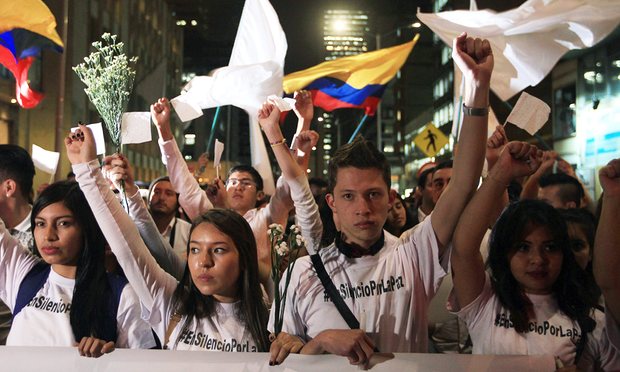Photo via The Guardian
This week the Colombian people rejected a peace deal brokered between the national government and the leaders of FARC, or Fuerzas Armadas Revolucionarias de Colombia, who have been in a state of consistent armed conflict since 1964. The conflict has, per BBC, claimed an estimated quarter of a million lives. The rejection came via a referendum, which the “no” side won, with fifty and one tenth percent of people voting against the deal. Voter turnout was a low thirty eight percent. The “no” campaign was led by former president Alvaro Uribe.
The peace deal was the result of four years of negotiations to end the conflict and was led by President Juan Manuel Santos and FARC leader Rodrigo Londoño Echeverri, also known as Timochenko. The deal included agreements for the FARC to cease all military operations and turn their weapons into the United Nations. In exchange, the FARC were set to receive leniency if they came forward and confessed voluntarily. They were to be spared jail time by specially convened courts and instead be put on house arrest or perform community service. Additionally the Colombian government offered financial help to FARC rebels to help start legitimate businesses, and offered guaranteed FARC seats in the Colombian congressional elections of 2018 and 2022, citing the need for them to transition from guerrilla movement to peaceful political party. As BBC points out, these concessions proved too great for voters, as they cited them for why they rejected the deal. Instead the “No” campaign wants guilty FARC members prohibited from holding office to serve prison time, and to pay compensation to their victims. The ceasefire remains in place between FARC and the government and has been extended to October 31st while negotiators meet again in Havana to try and come up with a deal that will pass a referendum.
FARC leader Timochenko has publicly stated his willingness to renegotiate and his side’s desire for peace, while President Santos has said “I will not give up, I will continue to fight for peace.” As Newsweek points out, it is likely that “any new agreement between the two sides would see harsher conditions” for FARC members, otherwise it is unlikely to survive another referendum.
The referendum is, as the New York Times reported this past Wednesday, the third this year to yield unexpected results. It follows the “Leave” victory in the referendum on Britain leaving the Europe-an Union in June and a referendum held by the military government of Thailand to enact a new constitution, a vote marred by the detainment of activists and prohibition of campaigning.



